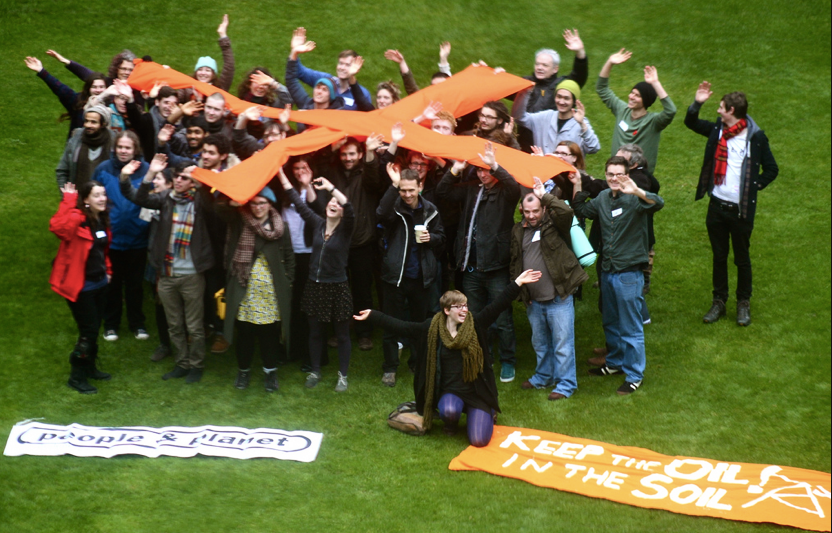Why students should campaign for fossil fuel divestment

Students have a special responsibility to campaign for fossil fuel divestment. Here’s why.
The campaign to divest from fossil fuels has been in the news quite a bit of late. From The Guardian publishing an article claiming that the ‘argument for divesting from fossil fuels is becoming overwhelming’, to alumni occupying Oxford University to protest its lack of decision on divestment, to students occupying LSE including divestment as one of their demands — divestment from fossil fuels is very much a major issue of our day. And our universities represent a major battlefield in which this debate is taking place.
About a week ago, Durham Students’ Union debated whether to support the call for the University to divest from fossil frees, and I had a chance to witness some of the arguments on both sides. While the motion passed, there were a few students who spoke out against divestment. I remember one person raising the point that the Students’ Union should not campaign on divestment, but focus on issues that are particularly relevant to students. I’ve written this article in response to such attitudes. Divesting from fossil fuels isn’t only relevant to students, it is something we should rally around and actively campaign for.
But before I discuss why students in particular should campaign for fossil fuel divestment, it would be worthwhile to say a word or two on the reasoning behind divestment. At the heart of the move for divestment is the fact we need immediate action on climate change. Otherwise, we face the certainty of catastrophic climate change. The scientific consensus agrees that we must avoid a 2°C rise in global temperatures, but as George Monbiot points out, to ‘deliver a 50% probability of no more than 2C of warming this century, the world would have to leave two-thirds of its fossil fuel reserves unexploited’. Simply regulating the use of fossil fuels is not enough — we need to ensure as much as possible is left in the ground. The alternative is an end to human civilisation as we know it: whole cities and island nations underwater, severe droughts affecting large swathes of the world, superstorms devastating others. However, rather than leaving our reserves of fossil fuels in the ground, fossil fuel companies are turning to new and dangerous sources of fossil fuels — from fracking to Arctic drilling to the exploitation of Canada’s tar sands — to extract every last drop of oil and gas from the ground.
As humans, this race to extract is something we should oppose if we want to see any continuation of civilisation as we know it; but as students, we hold a special responsibility to campaign against it. Our universities are complicit in the actions of these fossil fuel companies — investing an estimated £5.2 billion in fossil fuel companies, or £2,083 for every student in the UK. But the complicity of universities extends beyond financial investments (primarily in pensions and financial products, though also direct investment in oil and gas companies), they also provide fossil fuel companies with legitimacy in the public eye: through sponsorship from oil and gas companies, and recruitment for these companies within the university. A number of universities also ‘conduct advanced research and development on fossil fuels with Shell, BP and Exxon funding £56.7 million’.
In ignoring this, students are condoning the actions of the oil and gas industry. Universities can continue to profit out of the extraction of fossil fuels, and the fossil companies can enjoy the legitimacy and research their connections with universities provide.
Divestment provides the alternative we so desperately need. For every university that pursues an ethical investment policy and ceases to invest in fossil fuel companies, that money can instead be spent on investments that are to the benefit of society. But even more importantly, by divesting from fossil fuels and cutting their connections with these companies, universities can isolate them and undermine their legitimacy in the eyes of society. And companies that profit from the destruction of our planet through the extraction of fossil fuels — as with companies that profit out of war through the arms trade — should be shunned by society. As long as they can profit from the extraction of fossil fuels, as long as they are seen as legitimate companies in the eyes of the public, oil and gas companies will continue to drill until it is too late.
Students have a special responsibility to campaign for divestment from fossil fuels. Our universities play a key role in supporting the extraction of fossil fuels — through investment and research for oil and gas companies, but most importantly through providing social legitimacy for fossil fuel companies. If we want an end to this, students must mobilise to force our universities to end this support for an industry that — through the extraction of fossil fuels in the name of profit, but with no regard for people or the planet — threatens the future of society as we know it. And as the University of Glasgow has shown us last October, this is a battle that students can win.
- You can find more information on student campaign group People & Planet’s Fossil Free campaign here.




Leave a Reply